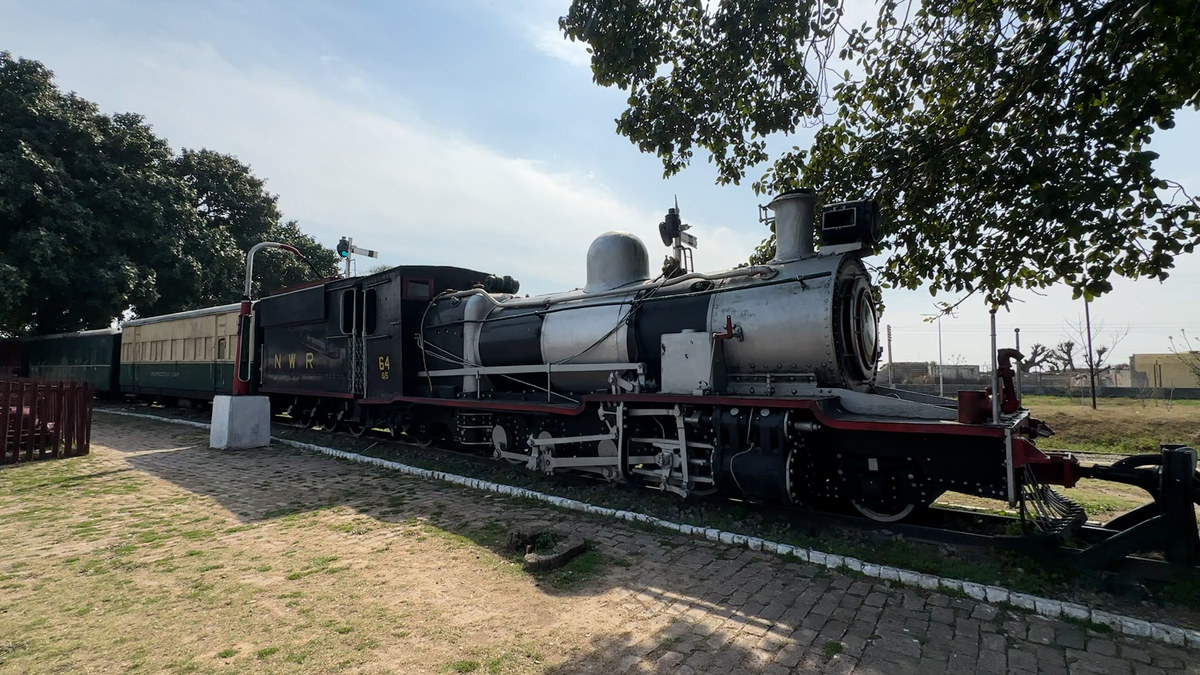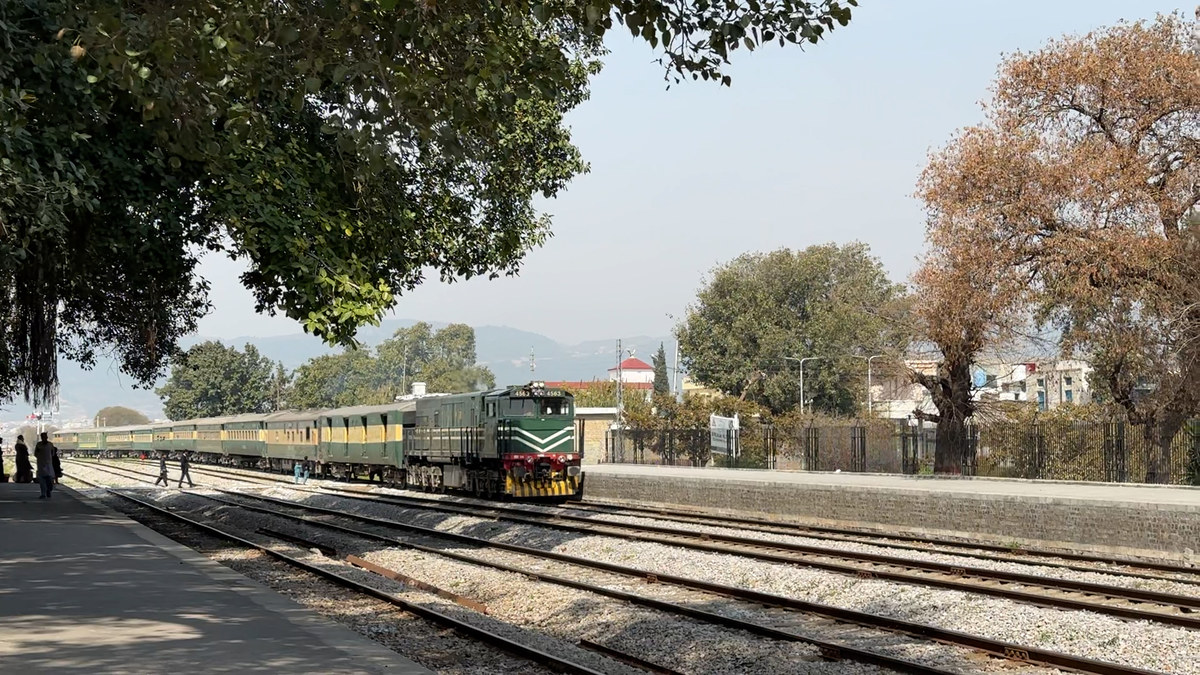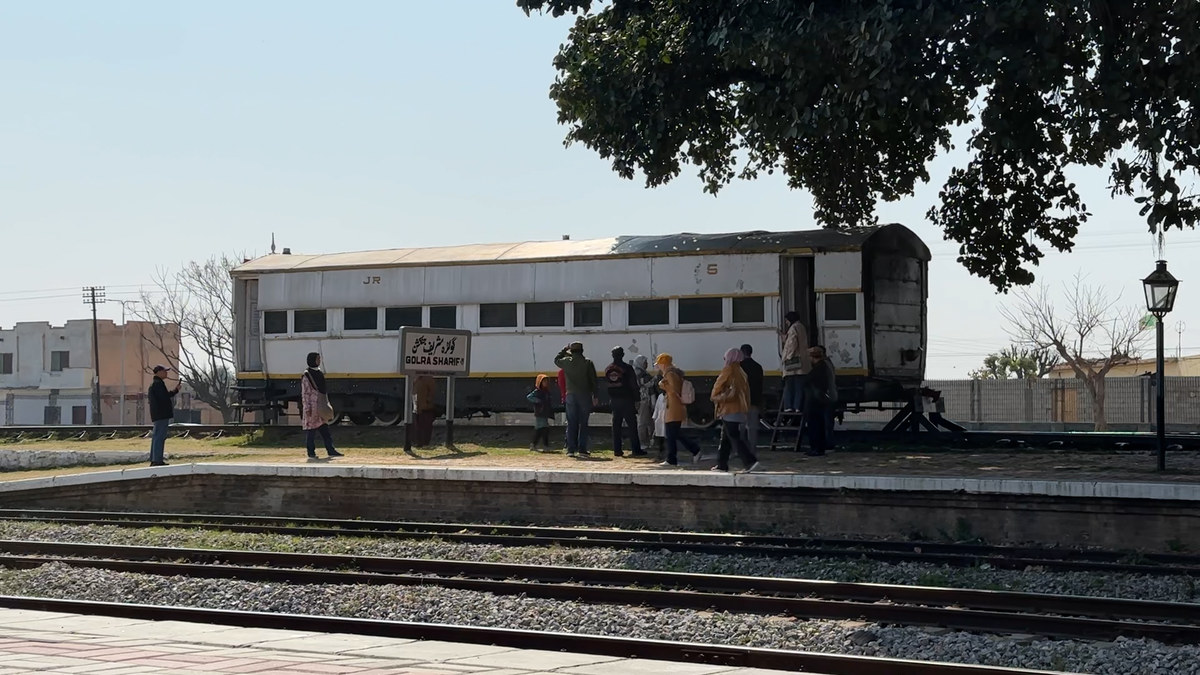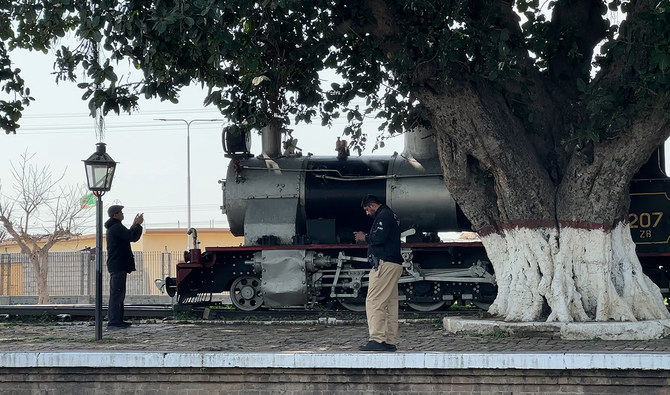ISLAMABAD: On a pleasant spring afternoon earlier this month, passengers stood waiting as the Karachi-bound Awam Express blared a horn to announce its arrival at the elegant Golra Railway Station in the suburbs of Pakistan’s federal capital, Islamabad.
Besides around a dozen trains that stop at the small, neatly-kept junction daily, it is also home to the Pakistan Railway Museum, whose grey sand stone walls hold inside them the 150-year-old history of the national, state-owned railway company of Pakistan.
The museum has two galleries, 18 locomotives and coaches, and a saloon which was once used by India’s last viceroy, Lord Mountbatten, and Pakistan’s founder and first governor general, Mohammad Ali Jinnah. The huge collection of artifacts detailing the history of railways in the Indian subcontinent includes a kerosene heater belonging to Mountbatten, vintage railway police guns, a punching machine for tickets, signal sticks and lamps, flags, drinking vessels, and a morse code machine.
Other items in the collection include surgical instruments used at the railways hospital, relief bogies as well as bells, kerosene lamps and a Neal’s ball token machine, captured from the Khemkaran station during the India-Pakistan war of 1965. A long pendulum by Gillet & Johnston Croydon, London, 1899, is another treasured item.
“The royal saloon of Quaid-e-Azam Muhammad Ali Jinnah is one of the finest and one of the best saloons in our collection,” Noman Fazal, the museum’s curator, told Arab News.

An 1826 steam locomotive Rx 207 on display at Pakistan Railways Heritage Point in Golra Sharif railway station on the outskirts of Islamabad on March 6, 2024. (AN Photo)
The museum also has steam locomotives belonging to foreign governments, including Canada and India. Another saloon at the museum was gifted by the Maharaja of the Indian State of Jodhpur to his daughter on her wedding.
“We have one saloon which [is] specifically associated with Maharani [princess] of Jodhpur,” Fazal said. “According to the railways’ record, it was gifted by Maharaja Jaswant II.
“Jodhpur was a princely state in India, so at that time the Maharaja gifted a wedding ceremony gift to his daughter, a whole saloon, JR-5.”
“HISTORY OF ENTIRE RAILWAY SYSTEM”
In the heyday of Pakistan’s railway raj, trains were a popular mode of travel used by the wealthy and working classes alike, with liveried bearers carrying trays of tea, and pressed linen sheets and showers in the first-class carriages of some services like the famed Khyber Mail.
Today, the services have little of that old-world charm. Indeed, for decades now, Pakistan’s rail service has been plagued by scandal and mismanagement, though it still remains a popular mode of transport and vital link connecting the country’s cities and towns. Most of the infrastructure is colonial-era, built under British rule before it was handed over to Pakistan at independence in 1947.
Founded in 1861 as the North Western State Railway and headquartered in Lahore, Pakistan Railways owns 7,789 kilometers of operational track across the country, stretching from Peshawar to Karachi, offering both freight and passenger services and covering 505 operational stations.
The Golra Railway Station was built in 1881 and named after the nearby village of Golra, famous for the shrine of a renowned saint, religious scholar and poet, Pir Mehar Ali Shah. The Pakistan Railways ministry established the museum at the station in 2003.

A passenger train arrives at Golra Sharif railway station on the outskirts of Islamabad on March 6, 2024. (AN Photo)
Several officers, most prominently Divisional Superintendent Ashfaq Khattak, worked tirelessly to put together the collection, rummaging for months and months through railway storerooms to collect artifacts of historic significance, according to the 35-year-old curator.
Fazal, who was appointed curator on a contractual basis in 2016, helped establish the second gallery in April 2018 and continues to sort artifacts to date with two assistants. While railway stations in Pakistan’s northwestern Attock Khurd town and the southwestern city of Quetta have collections of some historic rolling stock, the museum at Golra is the only formal railway museum in the South Asian country, Fazal added.
The first gallery of the museum is housed in a building built in 1881 when the British first constructed the station.
“If you see in Gallery I, we have one Neal’s ball token machine, it’s a war victory,” the curator said, referring to an electro-mechanical instrument provided at stations on single line railway sections, ensuring safety in train operations by dispensing tokens, which were handed over to train drivers as authority to enter a block section.
The ball was a “permission bell,” which a station master would give to a train driver, signaling that he could take the train forward on a particular railway track, Fazal explained.
“Without that ball, no train can proceed on the railway track,” he said. “So, this is an important thing for viewers and visitors.”
In the second gallery, established in 2018, a section is dedicated to the railways engineering department and showcases how the railway and its many bridges and tunnels were built.

Visitors arrive at Pakistan Railways Heritage Point in Golra Sharif railway station on the outskirts of Islamabad on March 6, 2024. (AN Photo)
Another section focuses on the subcontinent’s partition in 1947 and shows refugees migrating to Pakistan from India, the curator said.
Waheed Mehmood, a 38-year-old gallery assistant, said the museum remained open from 9am to 4pm throughout the week and an individual ticket cost Rs50 ($0.18).
“My job is that whichever people come, foreigners, staff from embassies, students from Pakistani colleges and universities, we brief them about every single thing at the museum,” Mehmood said.
“We have worked very hard here, if you see in the gallery, it shows the entire railway system, when it started.”
Nur Adiana, a professor of finance visiting Islamabad with a group of tourists from Malaysia, said she had loved visiting the museum for its rich history.
“In Islamabad, this is the first tourist site that we visited,” Adiana told Arab News.
“When I read [about] all those things, when they explained about, you know, all those bells that they use and all the locomotives, I love it because those are antiques for me.”
Inta Norisah, a visa consultant who was part of the tourist group, said she had learnt about the museum from a tour agency and visiting it had been a “good experience.”
“The government [has] preserved the place so well,” Norisah said. “It is a good experience for me to see things [from the times] before your [Pakistan] independence until now and all the things that they used for the trains.”












